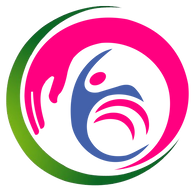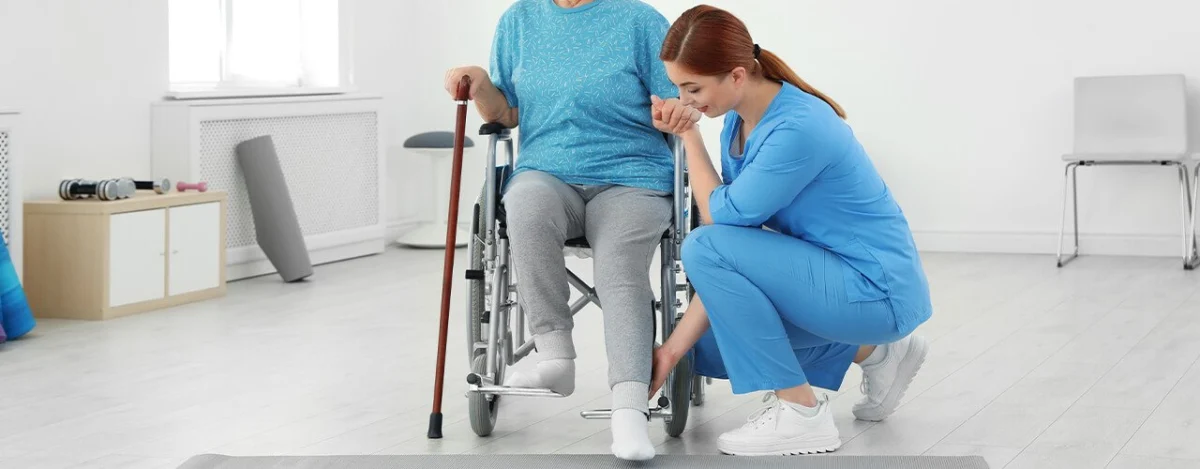Stroke Recovery Through Physiotherapy: What to Expect
Physiotherapy for Stroke Recovery
A stroke doesn’t just impact the brain, it affects your entire life. While the initial hospital care is critical, what happens afterward defines how well and how fast a person can recover. This is where physiotherapy plays a central role in stroke rehabilitation.
At FitoFine Physiotherapy Clinic, we help stroke survivors rebuild strength, regain movement, and restore independence, one step at a time, through personalized stroke rehabilitation programs.
Neurological rehabilitation draws on a wide variety of treatment techniques originating from different theoretical and philosophical backgrounds. The strength of supporting research varies considerably—while some interventions are supported by robust evidence, others rely largely on anecdotal reports and clinical experience.
Stroke remains one of the leading causes of adult disability worldwide, affecting more than 7 million people in the United States and over 133 million globally. The long-term consequences extend beyond the individual and significantly impact families, caregivers, and communities.
Survivors often experience persistent impairments in motor function, sensation, speech, swallowing, cognition, and emotional regulation. These limitations reduce independence and hinder social reintegration. Consequently, the primary goals of stroke rehabilitation are to:
- restore body functions,
- maximize independence,
- and promote community participation.
These objectives are best achieved through coordinated, interdisciplinary rehabilitation strategies.

Understanding Stroke and Its Impact
A stroke occurs when blood flow to the brain is interrupted, damaging brain cells and leading to physical and cognitive impairments. Common effects include:
- Paralysis or muscle weakness (often on one side)
- Poor balance and coordination
- Difficulty walking, sitting, or standing
- Speech and swallowing problems
- Spasticity, stiffness, and pain
- Fatigue and emotional challenges
Recovery varies by person, but the sooner physiotherapy begins, the better the chances of regaining function. n the past decade, research on stroke rehabilitation has grown significantly, particularly in physiotherapy interventions. Veerbeek et al. (2014) reported that the number of randomized controlled trials (RCTs) investigating stroke interventions has nearly quadrupled within ten years. Among 53 studied interventions, strong evidence was identified for beneficial effects in 30 of them. This growth reflects not only an expansion in the number of interventions with strong supporting evidence but also an increase in statistically significant outcomes across multiple domains.
A recurring theme in the literature is the importance of high-intensity practice. Evidence indicates that greater training intensity is a key factor in meaningful recovery after stroke—simply put, more practice produces better outcomes. Studies suggest that approximately 17 hours of therapy over a 10-week period are required to achieve significant improvements at both the body function level and in activity and participation domains of the International Classification of Functioning, Disability and Health (ICF).
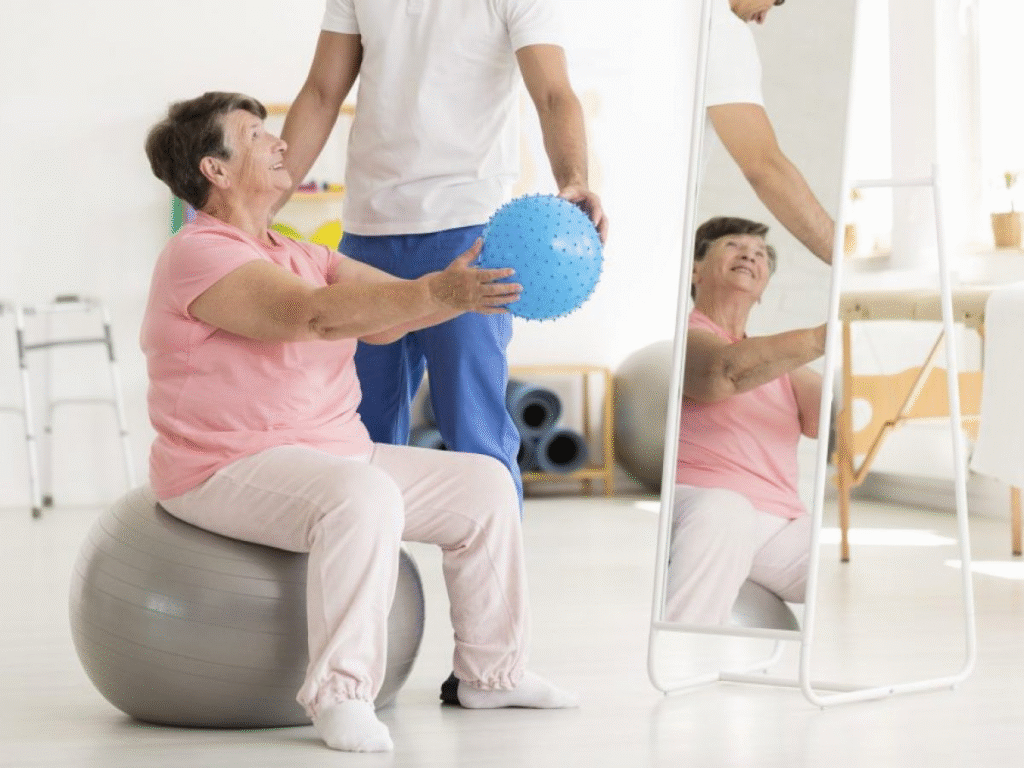
Why Physiotherapy Is Crucial After a Stroke
Post-stroke physiotherapy retrains the body and brain to work together again. With targeted movement therapy, the goal is to regain as much independence and function as possible.
Benefits of Stroke Physiotherapy:
Improves muscle strength and coordination
Reduces stiffness and spasticity
Enhances posture and balance
Restores everyday movements (walking, standing, sitting)
Prevents complications like joint contractures and pressure sores
Boosts emotional well-being through gradual progress
Physiotherapy Challenges
Time Constraints
National Clinical Guidelines recommend at least 45 minutes of daily therapy for stroke patients, provided that rehabilitation goals are present and the patient can tolerate the intensity. However, there remains a substantial gap between recommended practice and actual clinical delivery.
- In the Netherlands, stroke unit inpatients received an average of only 22 minutes of physiotherapy per weekday.
- In the United Kingdom, the average was slightly higher, at 30.6 minutes per day.
This shortfall highlights a significant barrier: despite evidence supporting higher-intensity rehabilitation, patients often receive much less than what is considered optimal.
Keeping Up with Evidence
The rapid growth of research also creates challenges for clinicians. With new studies emerging at an accelerating pace, physiotherapists often find it difficult to remain fully updated on the latest evidence and best practices.
There is an increasing need for research not only into effective physiotherapy interventions, but also into strategies for translating scientific knowledge into routine clinical practice. Identifying efficient ways for physiotherapists to maintain their skills and incorporate evidence-based methods into daily care remains a priority.
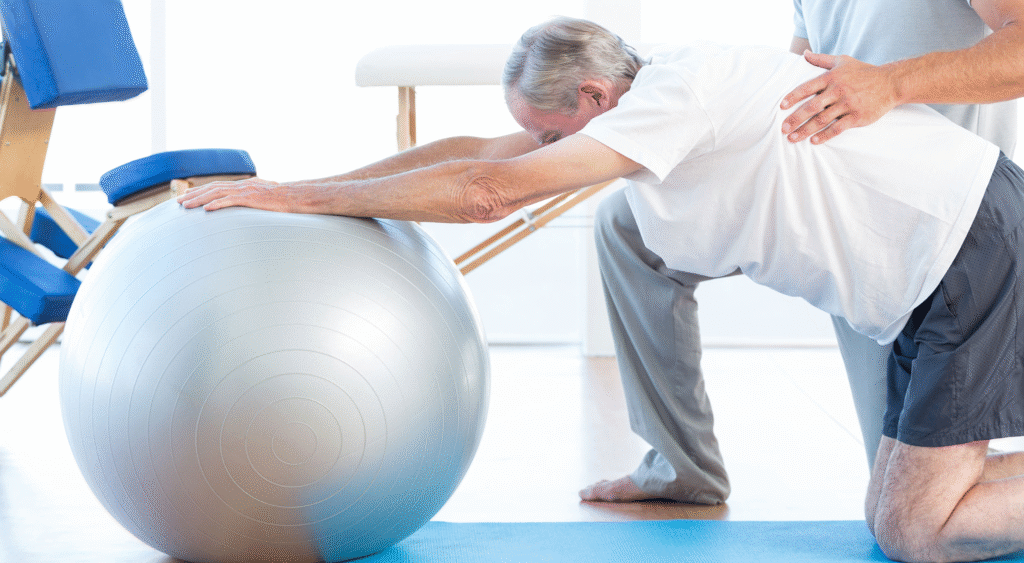
What to Expect in Stroke Rehab at FitoFine
We follow a customized and compassionate approach designed for your unique condition.
Initial Assessment
Our skilled physiotherapists evaluate:
- Level of paralysis or weakness
- Gait and posture
- Joint mobility and reflexes
- Balance and muscle tone
- Ability to perform daily tasks
- Emotional and cognitive health
This allows us to create a step-by-step, patient-centric rehab plan.
Goal Setting
Each patient has different goals. We work with you to:
- Regain walking ability
- Improve hand or leg coordination
- Prevent further decline or secondary issues
- Build confidence and encourage independence
Techniques We Use in Stroke Physiotherapy
At FitoFine, our rehab techniques are based on the latest neuroscience and functional recovery research:
Range of Motion (ROM) Exercises – Prevent joint stiffness and improve flexibility
Strength Training – Light resistance workouts to restore muscle power
Gait Training – Treadmill therapy, balance boards, walking aids for safe ambulation
Neuroplasticity Exercises – Repetitive, meaningful tasks that help the brain form new pathways
Functional Electrical Stimulation (FES) – Electrical pulses stimulate paralyzed muscles
Mirror Therapy – Uses mirror visual feedback to activate affected limbs
Balance and Posture Workouts – Sit-to-stand training, weight shifting, and fall prevention
Constraint-Induced Movement Therapy (CIMT) – Encourages use of the weaker limb by limiting the stronger one
When Should Stroke Physiotherapy Begin?
Early intervention = Better outcomes.
Rehabilitation should ideally start within 24–48 hours after a stroke, depending on the medical condition. At FitoFine, we help with:
Transitioning from hospital to home-based rehab
Continuing long-term therapy for optimal recovery
Creating home exercise routines for daily progress
Stages of Stroke Recovery in Physiotherapy
| Stage | Focus Area |
|---|---|
| Acute Phase (0-1 mo) | Passive exercises, bed mobility, positioning |
| Sub-Acute (1-6 mo) | Walking, coordination, strength training |
| Chronic Phase (6+ mo) | Skill development, confidence, lifestyle integration |
Recovery doesn’t follow a strict timeline. But with dedicated physiotherapy, progress is possible, even years after a stroke.
Home Exercises for Stroke Patients
Your recovery doesn’t stop at the clinic. We guide families and caregivers with safe and easy home exercises such as:
Arm lifts and shoulder rolls
Leg raises and heel slides
Supported walking
Seated core stability drills
Deep breathing and stress relief techniques
More than 80% of hospitalized stroke patients present with some form of hemiparesis. This condition includes negative symptoms (e.g., weakness, loss of dexterity) and positive symptoms (e.g., spasticity, abnormal synergy). While many patients experience spontaneous recovery, the extent of improvement varies widely.
Spontaneous motor recovery generally occurs within the first 3–6 months post-stroke, with the Fugl-Meyer Motor Assessment (FMA) scale commonly used to measure progress.
One of the most influential models is the Proportional Recovery Rule, which suggests that most survivors regain around 70% of their maximum potential function within three months. The calculation is based on the difference between the maximum possible FMA score (66 for upper limb) and the patient’s initial score in the first week post-stroke.
- Fitters: Patients with mild-to-moderate impairments often follow this 70% recovery trajectory.
- Non-fitters: Those with severe impairments (very low initial FMA scores) deviate from the rule and show less predictable recovery.
This proportional pattern has also been observed in lower-limb function, somatosensory recovery, neglect, and aphasia. However, the rule has been criticized for potential biases, such as mathematical coupling and ceiling effects in patients with mild impairment.
Neurophysiological studies support the model at a population level. For example, the presence of motor-evoked potentials (MEPs) within five days of stroke strongly predicts proportional recovery. By contrast, patients without MEPs (indicating corticospinal tract damage) often fail to follow the 70% recovery pathway.
To improve accuracy, newer models like PREP2 incorporate additional factors such as age, lesion characteristics, and stroke severity. While predictive accuracy remains imperfect (around 75%), these tools provide useful early guidance for clinicians, patients, and families.
Importantly, even patients initially classified as “non-fitters” may later demonstrate recovery, highlighting the role of neuroplasticity and the potential for targeted interventions.
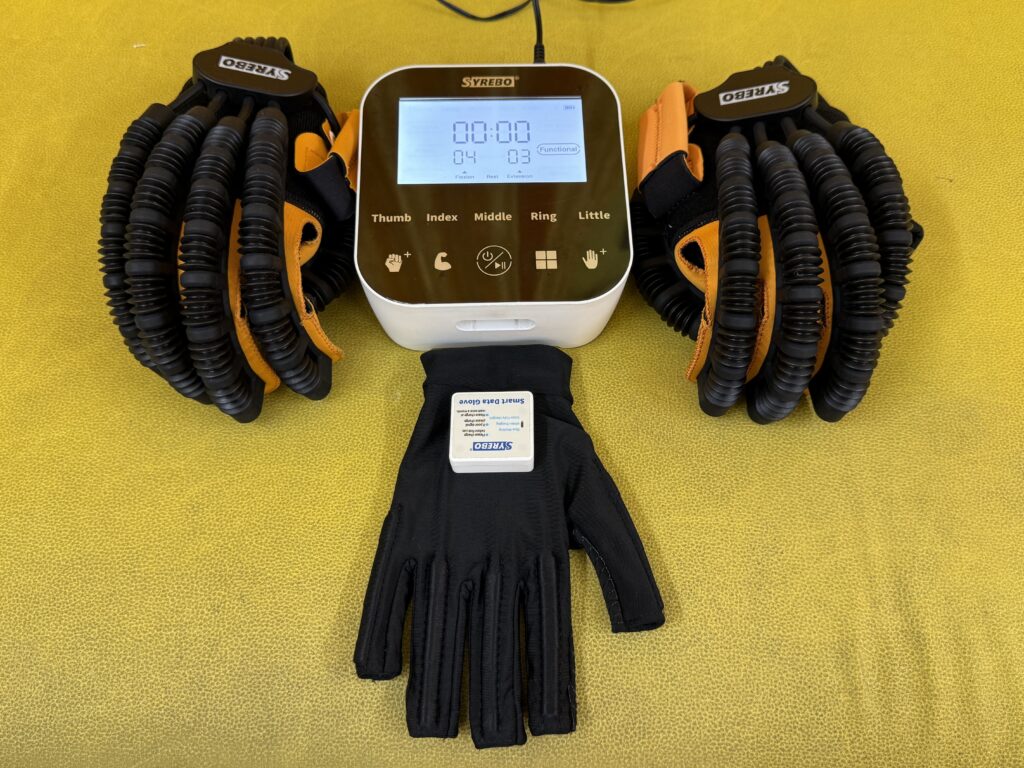
FAQs About Stroke Recovery & Physiotherapy
Q1. Can physiotherapy reverse paralysis?
Not always fully, but it greatly improves mobility, coordination, and daily life quality.
Q2. How long does stroke recovery take?
Recovery is different for everyone. You may notice improvements within 3–6 months, but long-term therapy may be needed.
Q3. Can stroke patients walk again?
Yes, with proper physiotherapy, most patients can walk again, independently or with aids.
Q4. Will the exercises be painful?
You may feel tired or sore initially, but sessions are adjusted to your tolerance and comfort.
Q5. Do you offer home physiotherapy for stroke patients?
We provide guided home routines and family training, along with in-clinic sessions.
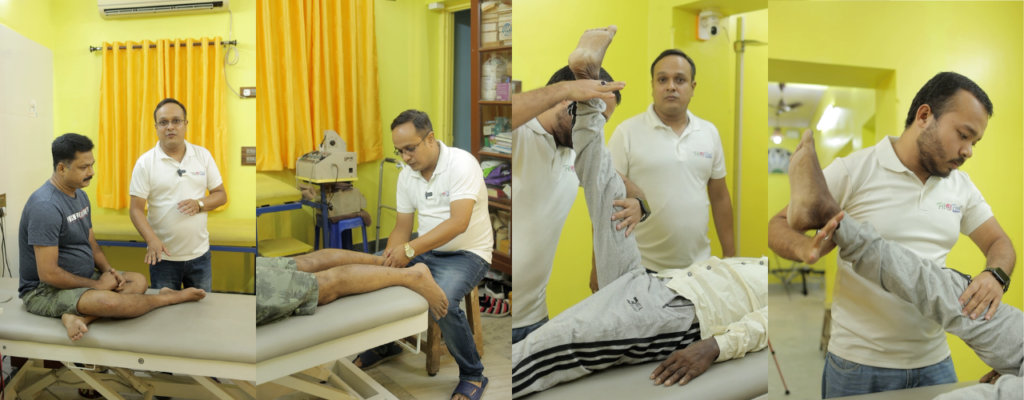
Why Choose FitoFine for Stroke Physiotherapy in Kolkata?
Experienced neuro-rehab physiotherapists
One-on-one personalized care
Evidence-based techniques
Modern rehabilitation equipment
Evening sessions for working families
Empathetic support for emotional healing
From the first step to full independence, we walk with you throughout your recovery journey.
Ready to Take the First Step Toward Recovery?
At FitoFine Physiotherapy Clinic, we don’t just treat symptoms, we help rebuild lives. Whether your goal is to walk again, regain your strength, or become independent, we’re here for you every step of the way.
Working Hours:
Mon to Sat: 5:00 PM – 10:00 PM
Sunday: Closed
Call: +91 6295115701
Email: fitofine.in@gmail.com
Website: www.fitofine.com
Reclaim your life after a stroke: Book a consultation at FitoFine today.
